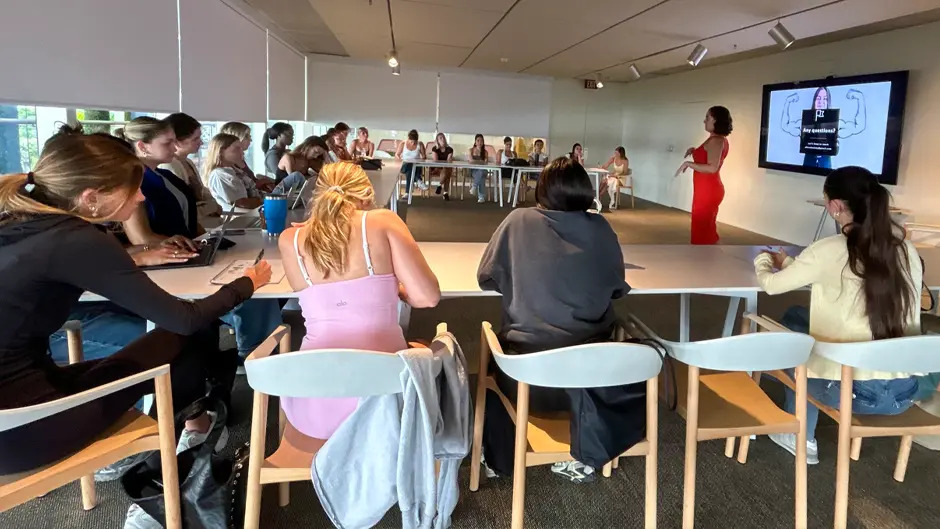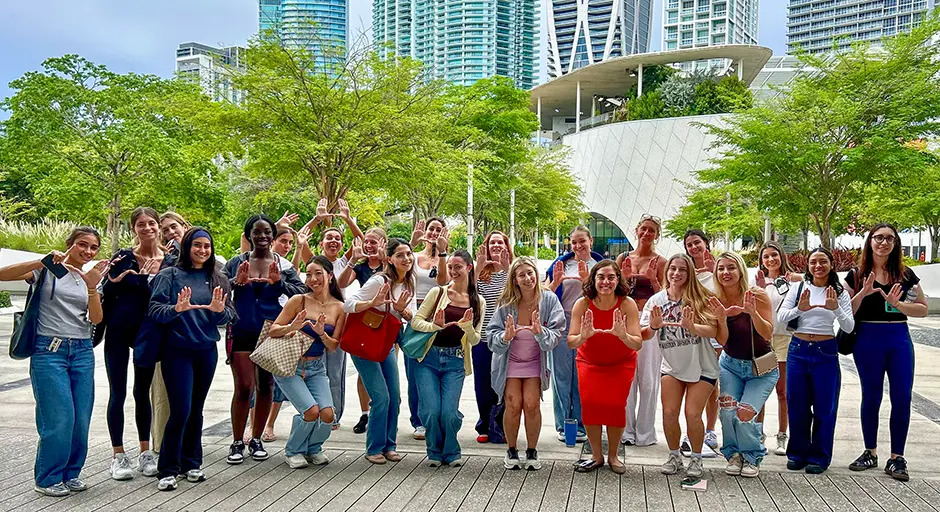Empowering women, breaking barriers
A course at the School of Communication equips students with the knowledge and tools to overcome gender disparities in public relations, drawing on authentic guest speakers and candid lessons.

University alumna Alexa Ferra speaks to undergraduate students at the Perez Art Museum of Miami. Photo courtesy of Heidi Carr
By Ashley Sewall
10-3-2025
This story originally appeared in News@TheU.
This is the class I wish I had in college, because it’s reality,” said Heidi Carr, director of the undergraduate public relations program at the University of Miami School of Communication. She was speaking about Women in PR, a course she designed and launched roughly 10 years ago to support women interested in public relations and to give them the tools to be more confident in themselves and their skills.
“I started [this class] with the question: If more than 85 percent of the people who practice PR are women, why were all the people who I was meeting at the time—in positions of power—why were they all male?” Carr said.
In fact, the Global Women in PR Annual Index from 2024 found that 61 percent of PR professionals reported male-dominated boardrooms, with 52 percent of respondents considering the gender split within their organization to be unfair.
Open to upperclassmen and graduate students, Carr teaches students how they can utilize their natural skills to overcome these statistics by inviting guests to speak to her class either in the classroom or at their workplace.
Recognize the issue.
It’s a common phrase, but a true one: The first step is acceptance. Accept that there will be differences in how men and women are treated, and then you can start working to overcome those differences.
This fall, the class took a trip to the Perez Art Museum of Miami (PAMM) to hear from alumna Alexa Ferra, senior director of marketing and communications at PAMM.
During her presentation, Ferra described her experiences through 10 years working in communications, navigating different coworkers and superiors.
“Unfortunately, because we’re women, we statistically have to work harder than our male counterparts,” Ferra said. “It’s a very sad fact, but it’s a fact that if we recognize it, we could do things to help, you know, go against those struggles.”
Carr echoed her sentiment.
“There are two words for the same skill,” Carr said. “For example, if a male colleague does something, he seems persistent. But if a woman does something, she can be seen as naggy or bossy.”

Canes visited the Perez Art Museum of Miami to learn from alumna Alexa Ferrer, senior director of marketing and communications (third from right, front row).
Don’t fault yourself.
The first lesson Carr teaches her students is to stop apologizing, because women have a tendency to be overaccommodating.
On the very first day of class, Carr addresses this head-on. Students are asked to keep a log of every time they say “sorry” and start recognizing the triggers for that behavior. The results are often eye-opening.
“Students will talk about how they trip over a rock and they apologize to the stone or the step,” Carr said. “In the workplace, we all tend to do things that demean our position. Women will also start a conversation with the whole, ‘Well, I kind of got an idea, but I’m not so sure, but do you have a few minutes, and I’ll talk to you about it and let you think.’”
This self-doubt begins early. Carr notes that up until a certain age, girls are just as confident as boys. But as they hit puberty and start transitioning to middle school, that natural confidence evolves into self-criticism, which continues into adulthood.
“One of the things that we really work on in this class is giving ourselves permission to shine that light and to make sure that we don’t apologize for being smart and vibrant and hard-working and persistent and clever and all the things that women are,” Carr said. “That we don’t go in low-balling our ideas before we’ve even pitched them.”
You’re not alone.
The issues women face in the workplace don’t have to be dealt with alone. Above all, the end goal of Carr’s class is to build a network of women who can support and lean on each other in both professional and personal life.
Carr emphasized her point with a quote by Mary Church Terrell, “Lifting as we climb.”
She wants her students to take away that the fight doesn’t stop when you get a seat at the table—it stops when the table has equal representation throughout.
“The class has been a transformative experience for me, especially as a senior looking ahead at my career,” said Greta Sabo, a public relations major currently taking Carr’s class. “Not only are the connections I’m making with these successful women important, but the lessons they are sharing are so inspiring. It truly puts into perspective the challenges of being a woman in a patriarchal society and how to overcome them and succeed in your career. I could not recommend the class enough.”






